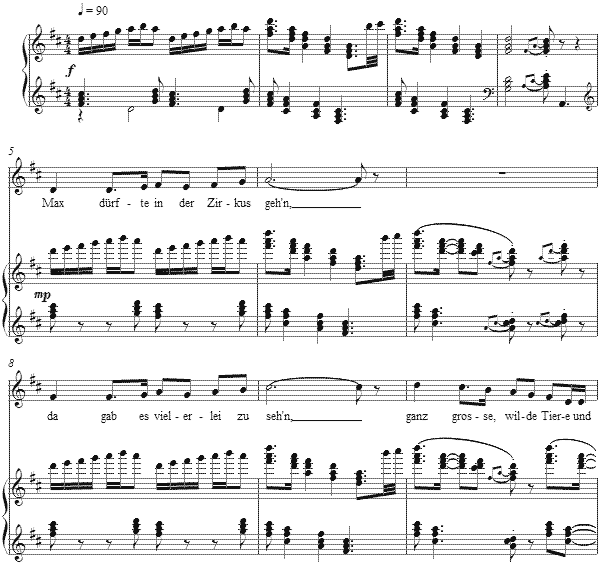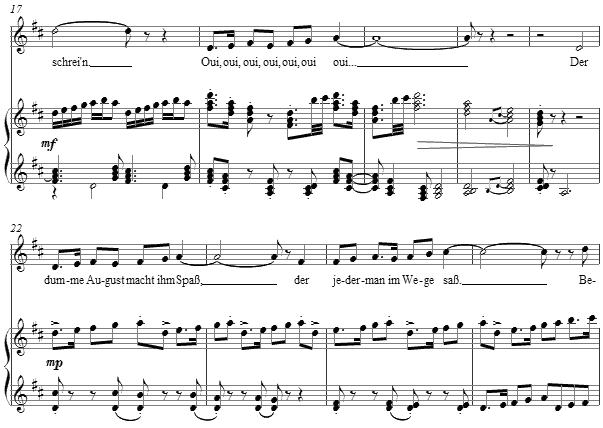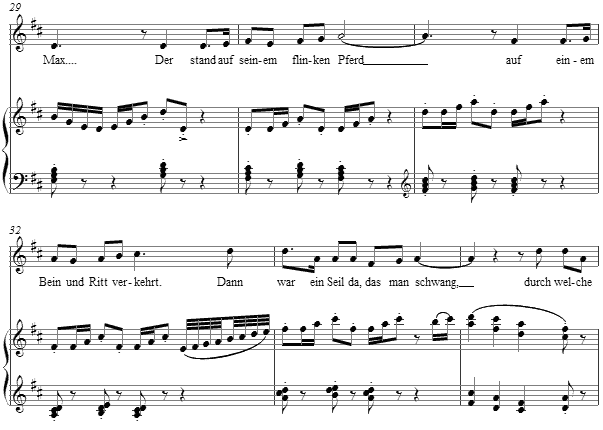Music and Texts of GARY BACHLUND
Vocal Music | Piano | Organ | Chamber Music | Orchestral | Articles and Commentary | Poems and Stories | Miscellany | FAQs
Der kleine Kunstreiter - (2009)
Erich Kurt Mühsam
for high voice and piano
Max durfte in den Zirkus geh'n,
da gab es vielerlei zu seh'n:
Ganz große, wilde Tiere und
auch einen klugen Pudelhund,
der Karten legte - und ein Schwein,
das auf französisch "Oui" konnt' schrei'n.
Der dumme August macht' ihm Spaß,
der jedermann im Wege saß.
Besonders hat's ein Reitersmann
jedoch dem Mäxchen angetan.
Der stand auf seinem flinken Pferd
auf einem Bein und ritt verkehrt.
Dann war ein Seil da, das man schwang,
durch welches Roß und Reiter sprang.
Das war ein Kunststück - Donnerblitz! -
viel schöner noch als Augusts Witz ... .
Als Mäxchen dann nach Haus gekommen,
hat Gertruds Springtau er genommen.
Das gab er Fips und Stips ins Maul
und sattelte den Steckengaul.
Das Schwesterchen faßt an das Tau:
Nun, Mäxchen spring'! - Fips bellt: Wau, wau!
Die Schwester schwingt. - Max läuft. - Stips bellt. -
Nun, hops! - Max springt. Und - bums! - Er fällt.
Hier fliegt ein Schuh; da fliegt der Helm;
hier fliegt das Pferd; - da liegt der Schelm. -
Die Lehre hat dem Max gezeigt:
Kunstreiter sein ist nicht so leicht.[ 6 pages, circa 3' 40" ]
Erich Kurt Mühsam
Max wanted to go to the circus,
With so much there to see:
Huge, wild animals and
A right smart poodle,
Were advertised -- as well as a pig
That could oink "oui" in French.
Boorish August made fun of it,
As people often do.
Especially there was a horseback rider
That had excited Max,
Who could stand on the fleet steed
On one leg as it ran.
And there was a jump rope
Through which horse and rider leapt.
This was art -- amazing! --
So much more lovely than August's joking....
When Max came home
He took Gertrude's hobby horse,
Named Fip and Stips [ 1 ], bridled
And saddled the old wooden nag.
The little sister held the rope:
Now, Max! Jump! Fips bellowed, Wow!
The sister swung. Max rode. Stips heehawed.
Now, up! Max jumped! And -- plop -- he fell.
Here lay a shoe, and there flew a helmet;
Here lay the hobbyhorse; there lay the rascal.
The teacher saw Max and observed:
To be a horseback acrobat is not so easy.
gb
This fanciful tale brings a variety of characters into a few compact lines in telling the simple story of a boy clumsily falling off a rocking horse. We know of four by name, and others by their occupations as Mühsam puts into rhyme a detailed explanation for this childhood mishap of relatively little consequence.
The setting plays lightly with periodicity, such that entry of the first "verse" in this through composed setting begins on the first beat of measure five. With successive sections in a verse-like texture, this melodic pattern is shifted beat by beat earlier. Additionally the melodic form is answered up a third to the first phrase for another level of shifting items across pitch and time.
The first shift occurs at measure 21, wherein the melodic line essentially begins before the downbeat of the next measure. Additionally other periodic gestures frustrate the seemingly solid duple meter, as for example the accompaniment's top voice at measure 22 is in another period from the vocal line, its repetitions marked with a marcato signs.
The shift earlier continues, such that the vocal line begins two beats earlier than in its original appearance, as at measure 29. Other tricks in shifting periodic phrases may be found deeper into the setting. Still the texture as a whole masks this in a moderate contemporary
The score is available as a free PDF download, though any major commercial performance or recording of the work is prohibited without prior arrangement with the composer. Click on the graphic below for this piano-vocal score.
NOTES
[ 1 ] From 1879 through 1908, Wilhelm Busch popularized a cartoon ape, Fips der Affe, combining the character with his other popular cartoon characters, Max und Moritz. Thus did the name enter German culture.
Another author, Max Ophüls, created a Christmas revue in 1928, with the name Fips und Stips auf der Weltreise, for the Lobetheater in Breslau, producing it a year later for the "Schlesische Funkstunde." This Fips und Stips found its way into the culture, some children adopting one or both as nicknames. Mühsam gives the hobbyhorse this nickname, a reference familiar to children of that time.



